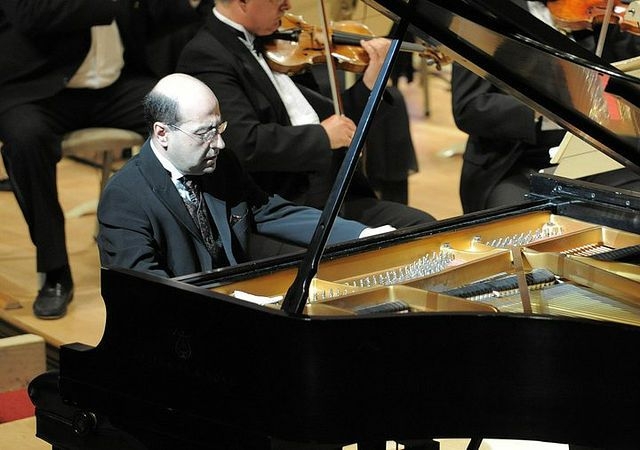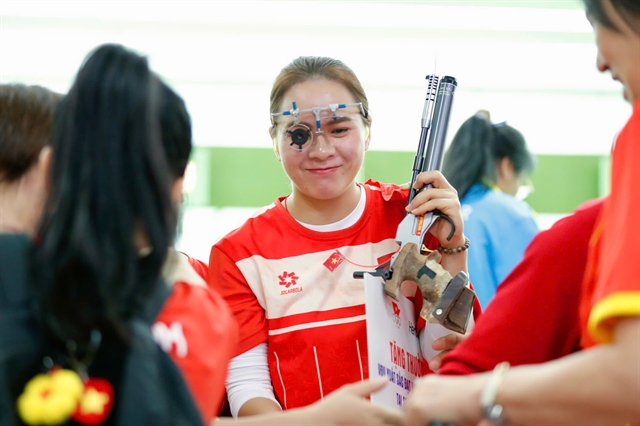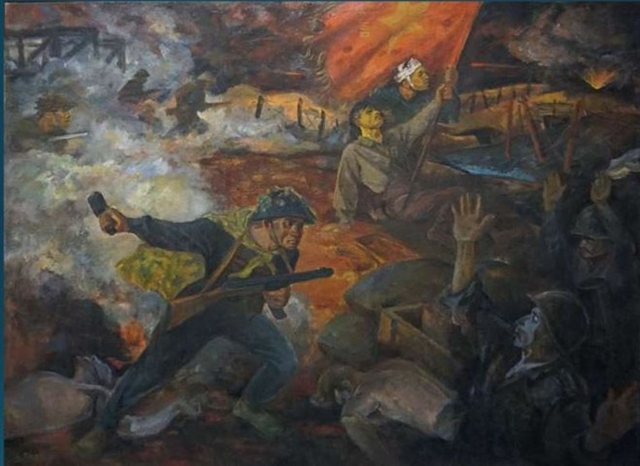 Life & Style
Life & Style
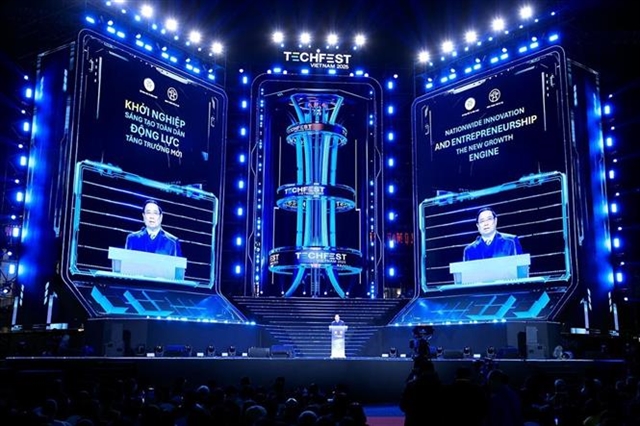
 |
| Former Deputy Foreign Minister Colonel Hà Văn Lâu was a member of the Democratic Republic of Việt Nam (DRV)’s negotiation delegation at the Geneva Conference in 1954. Photo courtesy of Ambassador Hà Văn Lâu's family |
By Khánh Linh
In the early days of May 1954, as the Vietnamese resistance army intensified its offensive against the French stronghold of Điện Biên Phủ on the military front, the Vietnamese negotiation delegation in Geneva was urgently preparing for a diplomatic struggle.
Colonel Hà Văn Lâu, a former deputy Foreign Minister, was in the negotiation delegation of the Democratic Republic of Việt Nam (DRV) at the Geneva Peace Conference in 1954. In a 2014 interview with the Vietnam News Agency, he reminisced about the Geneva talks, which restored peace in Việt Nam and Indochina as a whole.
Alongside Deputy Defence Minister Tạ Quang Bửu, Col Lâu served as a military expert for the delegation. He recalled their journey by train via Beijing and Moscow, and arriving in Geneva on May 4, 1954.
At that time, the DRV had not yet received an official invitation to the talks. The invitation only arrived on May 8, one day before the session on Việt Nam began.
"As military experts of the delegation, Deputy Defence Minister Tạ Quang Bửu and I focused on studying the military aspects of the talks, which included the ceasefire, troop movements, and France’s troop withdrawal from the three Indochinese countries,” Lâu said.
"I felt very anxious because the task was new to me, and there was very little information available," he added.
On May 7, 1954, the Vietnamese army and people won the Điện Biên Phủ battle. Reflecting on this pivotal moment, Col Lâu mentioned that the team learned about the Điện Biên Phủ Victory through western media before receiving reports from home.
"Our joy knew no bounds. Head of the delegation Phạm Văn Đồng embraced everyone, and we spent a sleepless night discussing plans for the meeting the next morning,” he said.
This triumph significantly bolstered the standing of the DRV delegation at the talks.
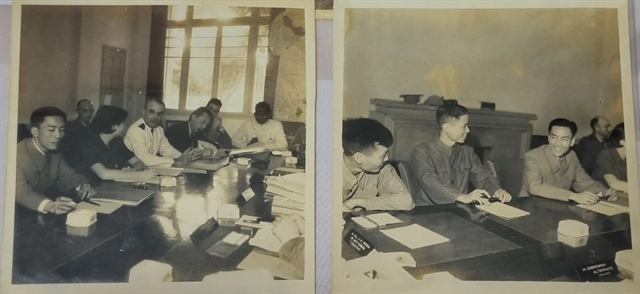 |
| Ambassador Hà Văn Lâu, head of the Liaison Delegation of the General Staff of the Việt Nam People's Army takes photo with the International Commission for Supervision and Control of the Implementation of the Geneva Accords during the period of 1954-1958. Photo taken from the archives of the National Archives Centre 3 |
Col Lâu said that the Điện Biên Phủ victory held immense significance and greatly influenced the diplomatic efforts of the DRV in Geneva. As a result, the Vietnamese delegation approached the conference from a position of victory.
At 4:30pm on May 8, the Geneva Accords on Indochina were initiated. It was from this moment that Col Lâu fully engaged in diplomatic endeavours, advocating for peace, independence, and national unification.
The atmosphere at the Geneva negotiations was extremely tense, particularly regarding the demarcation and relocation of military forces from both sides. Lâu noted that he and Bửu held numerous meetings with the French delegation to discuss this issue.
Through much debate, the conference at last decided that Parallel 17 would be the line to temporarily divide the North and the South, which was along the Bến Hải River to the north of Quảng Trị Province.
Following 75 days, 31 sessions, and numerous bilateral and multilateral meetings, the Geneva Accords on peace for Việt Nam was signed at midnight on July 20, 1954.
With the monumental victory at Điện Biên Phủ and the steadfast principle of "independence, national unification, and territorial integrity", the DRV delegation achieved its objective of securing an agreement to end the war and restore peace in Indochina.
From this juncture, Col Lâu's military career seamlessly transitioned into a diplomatic path.
Born in 1918 in Lại Ân Village, Phú Mậu Commune, Phú Vang District in Thừa Thiên Huế Province, Ambassador Lâu led a remarkable life. Originally a civil servant under French colonial rule, he soon embraced the revolutionary cause and actively participated in armed struggle against French rule and Japanese occupation in Ninh Hoà and Khánh Hoà before returning to fight in his homeland in Huế City.
Earning high trust from the Communist Party and the resistance government under President Hồ, he assumed several pivotal roles, including head of the Combat Operations Department of the General Staff of the Việt Nam People's Army (VPA); military specialist at the Geneva peace talks; and head of the Liaison Delegation of the General Staff of the VPA.
He served as deputy head of the Vietnamese diplomatic delegation in the Paris peace talks, Ambassador of Việt Nam to the Republic of Cuba, France, and the United Nations. Finally, he held the post of Deputy Minister of Foreign Affairs from 1982 to 1984.
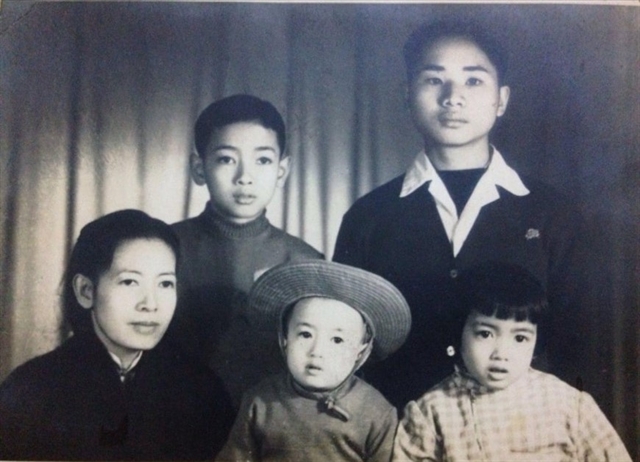 |
| Hà Thị Diệu Hồng (first from right) and Hà Thị Ngọc Hà (centre) in the family photo with their mother Nguyễn Tăng Diệu Hương (first left and her two brothers Hà Văn Minh and Hà Tăng Lâm in 1962. |
Father and daughters
Hà Thị Diệu Hồng, one of Lâu's two daughters, said that his farther's entire life was devoted to the nation and its people.
She said during Lâu's diplomatic missions, he was often away from home. That’s why Hồng and her sister, Hà Thị Ngọc Hà, had little time with their father during their childhood.
During the period when Lâu served as deputy head of the Vietnamese diplomatic delegation at the Paris peace talks, her family sometimes received his evening calls from the Ministry of Foreign Affairs, inquiring about their wellbeing and school progress.
"We missed our father dearly. There was an occasion when our entire family was invited by Minister of Foreign Affairs Xuân Thủy for dinner and photo taking to send to our father," Hồng said.
During times of evacuation from Hà Nội to rural areas due to US air bombing, Ambassador Lâu sent letters reminding them to take care of themselves. He also advised the two sisters to help the homeowner with household chores, as the host had provided them free abode.
It wasn't until peace was restored that Lâu had the opportunity to spend much time with his two daughters.
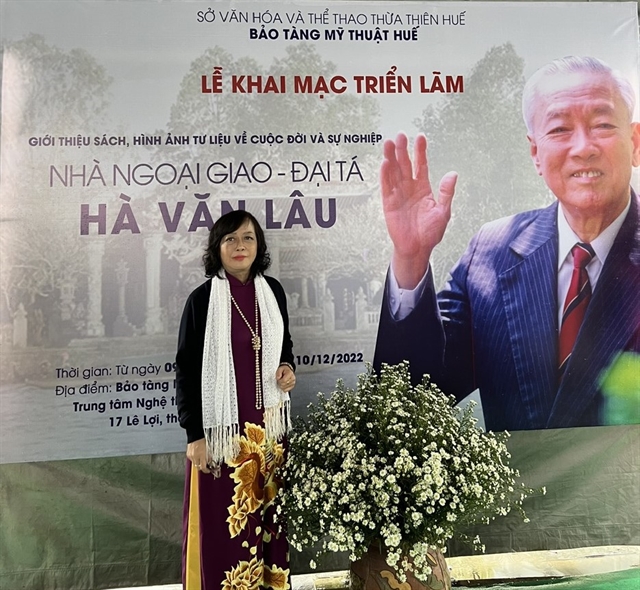 |
| Hà Thị Diệu Hồng at the opening ceremony of the book about Ambassador Hà Văn Lâu in the central province of Thừa Thiện Huế. |
"My father often listened to radio broadcasts in English and French, so we enjoyed learning foreign languages from a young age. I can never forget those moments when the whole family sat together, had meals, and listened to French songs," Hồng said.
When Hà Thị Ngọc Hà, former Ambassador of Việt Nam to Chile, decided to pursue a diplomatic career, Ambassador Lâu began sharing insights into the intense intellectual battles at the negotiation table, diplomatic strategies, and the lessons behind anecdotes.
Every story he recounted about the Việt Bắc resistance base, the Geneva peace negotiations in 1954, and the Paris peace talks in 1973 deeply resonated with them.
Hồng remembered a remark Ambassador Lâu made in response to Deputy Head of the US Delegation William Harriman's accusation of the North invading the South during a closed-door meeting at the Paris conference.
"I am from the central region. I fight so that I can return to my homeland and meet my mother. And you accuse me of invading my own homeland? The American delegate couldn't say anything in response," she quoted Ambassador Lâu as saying.
Hồng said that the ambassador always emphasised the importance of "maintaining a warm heart and a cool head" during diplomatic negotiations. This simple yet profound lesson guided her throughout her life.
Throughout various positions held during a crucial period in the country's history, Ambassador Col Lâu collected and preserved multiple documents, notes, and especially photographs sent by foreign journalists and Vietnam News Agency reporters during many historical events in the country.
His family donated those invaluable assets to the National Archives Centre 3 in August 2022.
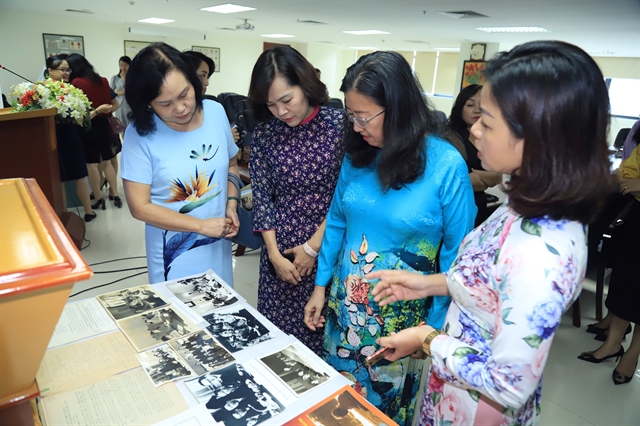 |
| Ambassador Lâu's daughter Hà Thị Ngọc Hà (second from right) admires the diplomatic activities captured in her father's photos during the ceremony of donating precious documents to the National Archives Center No3 in August 2022. VNA/VNS Photo Chu Thanh Vân |
Upon retirement, former Deputy Minister of Foreign Affairs Lâu and his wife returned to live in their hometown of Thừa Thiên Huế.
Ambassador Lâu passed away in HCM City in 2016 at the age of 98. VNS


